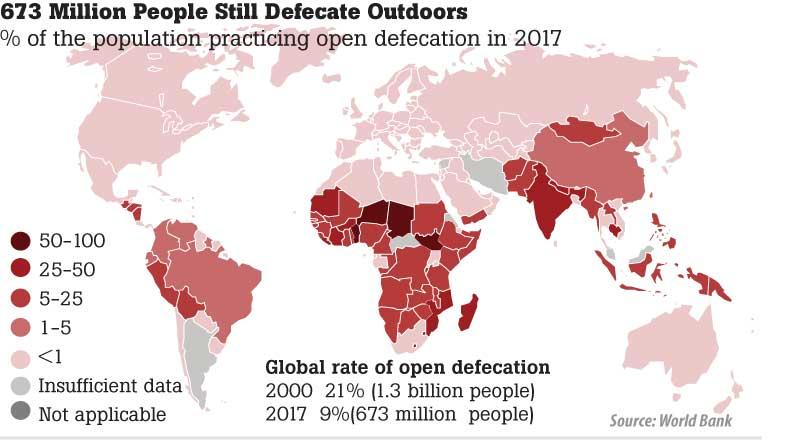27 Nov 2019 - {{hitsCtrl.values.hits}}
Unfortunately, World Toilet Day doesn’t receive as much attention as other universally recognised “days” such as World Environment Day or World Health Day. But the day November 19, was a chance to focus on an issue that millions of people worldwide suffer from - the lack of a safe and private place to go to the toilet.
 What is open defecation and where is most affected?
What is open defecation and where is most affected?Open defecation – to put it simply – is where people poo in open areas such as fields, forests, bushes, lakes and rivers – rather than using a toilet. This could be because the infrastructure isn’t available, cultural norms or lack of education surrounding the health risks of the practice.
The good news is that globally, open defecation is decreasing steadily, and the elimination of open defecation is one of the targets of the Sustainable Development Goal (SDG) to be achieved by 2030.
However, the SDG targets are not on track and to reach them would require substantial acceleration in toilet use - particularly in Central and Southern Asia, Eastern and Southeast Asia and Sub-Saharan Africa.
In a press release from the United Nations News Centre, UN agencies have reported that of the 673 million people practising open defecation, 91 per cent live in rural areas.
An increase in population in countries including Nigeria, Tanzania, Madagascar and Niger, but also in some Oceania states, is leading to localised growth in open defecation.
While in the grand scheme of things, pooping outside is sometimes not perceived to be a serious issue – it’s been practised for centuries and fully ingrained in some societies. But the health consequences are far-reaching – not just through cholera, dysentery, hepatitis A and typhoid, but for women and girls especially, not having a private space, exposes them to increased sexual exploitation and violence.
One gram of faeces can contain 10 millionviruses, one million bacteria and one thousand parasite cysts
According to the UN Children’s Fund (UNICEF), one gram of faeces can contain 10 million viruses, one million bacteria and one thousand parasite cysts. Poor sanitation and hygiene practices (for example, not handwashing with soap after defecation and before eating) contribute to over 800,000 deaths from diarrhoea annually, and World Health Organisation (WHO) research shows that’s more people than those who die from malaria.
WHO and UNICEF report that in 2016, 21 per cent of healthcare facilities globally had no sanitation service, directly impacting more than 1.5 billion people and over 620 million children worldwide who lacked basic sanitation services at their school.
There are two main issues that need to be overcome to stop outdoor defecation.
WHO estimates that every $1 invested in water and toilets returns an average of US $4 in saved medical costs, averted deaths and increased productivity. Hygiene promotion is also ranked as one of the most cost-effective public health interventions. Conversely, a lack of sanitation holds back economic growth, especially in regards to women who will also avoid going to work if private facilities are not available, especially if they are menstruating.

Also stated in the recent press release, the Member States and UN agencies have urged the provision of financial resources, capacity-building and technology transfer to help developing countries to provide safe, clean, accessible and affordable drinking water and sanitation for all.
They advised that increasingly, governments and their UN agency partners have road-maps to tackle the issue, and the Water Supply and Sanitation Collaborative Council (WSSCC) has been providing grants for community-based solutions for a decade.
In Sri Lanka specifically, the number of people practising open defecation is not clear. In 2015, the WHO/UNICEF Joint Monitoring Programme (JMP) for Water Supply and Sanitation reported that, practising it was 2.65 per cent of the population, while another study that year put the figure at 2.9%.
In an AFP article in May on the 2019 Budget, it put the statistic at a staggering 15% of the population with former Finance Minister Mangala Samaraweera advising parliament that the government would allocate 4,000 million rupees (US$22 million) to build toilets for people living in over 260,000 private homes to stop the practice of open defecation.
The Daily Mirror was unable to find any evidence that progress had been made, but with the change in government in Sri Lanka, hopefully, this basic necessity will be addressed and citizens can go to the toilet with safety and dignity.
28 Nov 2024 5 hours ago
28 Nov 2024 6 hours ago
28 Nov 2024 7 hours ago
28 Nov 2024 8 hours ago
28 Nov 2024 9 hours ago